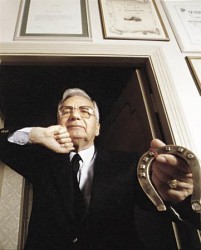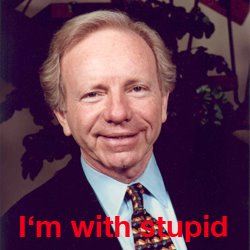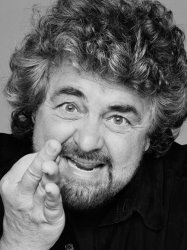 Propaganda 2
Propaganda 2, or P2, is a Masonic lodge that acted as a
shadow government in Italy from 1974 to 1981. Based on the principal that ideologies and values can be easily manipulated by commercial TV and a complacent press, P2 managed to seamlessly place its members in all spheres of Italian life and secretly shaped Italy's political and economic landscape with the backing of a select group of political and Industrial elite, the Sicilian Mafia and the American CIA.
Rumors of a Masonic lodge that involved Italy's highest powers had been spreading since the mid-1970, but still Italian citizens were in shock when a list of P2 members was revealed to the public on May 20th, 1981. The list contained about 900 illustrious names; among them were four ministers or ex-ministers, 44 members of Parliament, all the chief positions of the secret services, the head of the Revenue Guard Corps (Guardia di Finanza), high officials of the state police (Carabinieri), army officers, prefects, magistrates, bankers, entrepreneurs, newspapers’ directors, journalists, and so on. A week after the list was published, the ruling government was forced to resign.
The Manifesto of P2, titled
Plan for Democratic Rebirth, was impounded on July 4th 1981, shortly after the discovery of the list of members, in the double-bottomed suitcase of Maria Grazia Gelli (daughter of the well known fascist Licio Gelli). The plan explained how P2 intended to
“make use of financial aids” to enter the most diverse places of power:
political parties, the press, labor unions, and the three branches of government. The plan explains in detail how to buy a considerable influence within the governing party of the time, the Christian Democrats. The part that concerned the press is particularly terrifying. P2’s plan was to position trusted journalists in the major national newspapers, so that they always presented a favorable image of P2 politicians and the P2 agenda. National, regional, and local activist press had to be infiltrated as well. TV would be controlled to manipulate public opinion and to lull the population into a submissive chorus of approval. Infiltration was organized among judges and magistrates, as well as among bankers and police officials of every rank. The aim was to set up an authoritarian government of privileges, anti-democratic, falsely populist, and reactionary.

To understand the history of P2, one should examine the biography of his leader, fascist freemason
Licio Gelli. Gelli served with fascists in the War in Spain and had always been close to extreme fascist movements. His strong anti-communist stand and his ability to bond with the highest ranks of power led him to work for a few years for the
United States’ CIC (Counter Intelligence Corps) and with the
British secret services. Gelli’s most notable collaboration was with
Gladio, the secret service agency heavily financed by CIA and NATO to counter Communist influence after World War II in Italy. Gladio’s methods were far from orthodox, and acted through the so-called
"strategy of tension." The strategy of tension consisted in setting up terrorist attacks to be blamed on extreme left groups. Between 1964 and 1984, Gladio, whose existence and responsibilities were ascertained only in 1990, killed 149 people in 8 terrorist attacks.
When Licio Gelli founded P2 in 1974, he brought in Gladio’s techniques, principles, and influential friendships within the new organization. Some modifications were needed, though. Direct confrontations and attempted coups were replaced by a more subtle and deliberate occupation of the positions of power. For ten years, P2 was directly involved in all levels of Italian mysteries and scandals. These include numerous
banking scandals (Banco Ambrosiano, the Vatican banking scandal), the
kidnap and
murder of Italian Prime Minister
Aldo Moro, the assassination of activist journalist
Mino Pecorelli, terrorist attacks like the bombing on the train “Italicus,” the
Iran-Contra affair, the assassination of Swedish prime minister
Olof Palme, and many more illegal economic maneuvers.
Although freemasonry was banned in 1981 and Licio Gelli is confined to house arrest, many fear that today P2 is as strong as ever. Many of the P2 members have kept their positions of power, and one notable member, businessman
Silvio Berlusconi, has been prime minister twice in the past 12 years. Silvio Berlusconi’s amazing career bears all the marks of P2. From his humble beginnings as a singer on cruise boats, Berlusconi entered P2 and received all means of economic and political support from the organization. It is not by chance that Berlusconi built an economic empire in a handful of years without any proof of legal transactions. The right friends and a benevolent disposition for money laundering go a long way. Today Berlusconi is Italy's richest man and despite almost constant investigations into his shady business practices and his relationships with Mafia figures he managed to hold power longer than any other Prime Minister since World War II.
One mark of P2 lies in the way Berlusconi gained and held onto power: owner of publishing companies, radio stations, and three of the six major TV networks of the country, Berlusconi had all means of information on his side. In his 5-year government, the ex-P2-member managed to
annul most of the laws, and thus most of the charges against him, for corruption and collaboration with the Mafia, as he advanced the cause of his own businesses over his competitors. In 1996, commenting of the program of Silvio Berlusconi's improvised political party, Fortza Italia, Licio Gelli affirmed that Berlusconi “took our plan for rebirth and copied almost all of it.”
Many historians believe that despite it's outing
P2 has already carried out a slow-motion but successful coup d’etat. The tragedy is that the story of P2 is not the stuff of conspiracy theory. P2 is a
fact of Italian (and American) history with names, dates and an agenda which can all be verified. The
Plan for Democratic Rebirth has cost the lives of hundreds of people, destroyed Italy's economic competitiveness, tramped over justice and legality and disenfranchised Italy's voting population. Propaganda and corruption has slowly brought Italy down to the ranks of the
"semi-free", according to
Freedom House , a non-profit, non-partisan organization that publishes a yearly survey on freedom around the world (for freedom of speech
Italy ranks no. 77). Hopefully Italy's experience can serve as a cautionary tale for countries that also see the
rise of strong economic and political powers with shared ideologies and the
consolidation of media power, all of which render the press, the people and thus democracy, weaker by the day.













